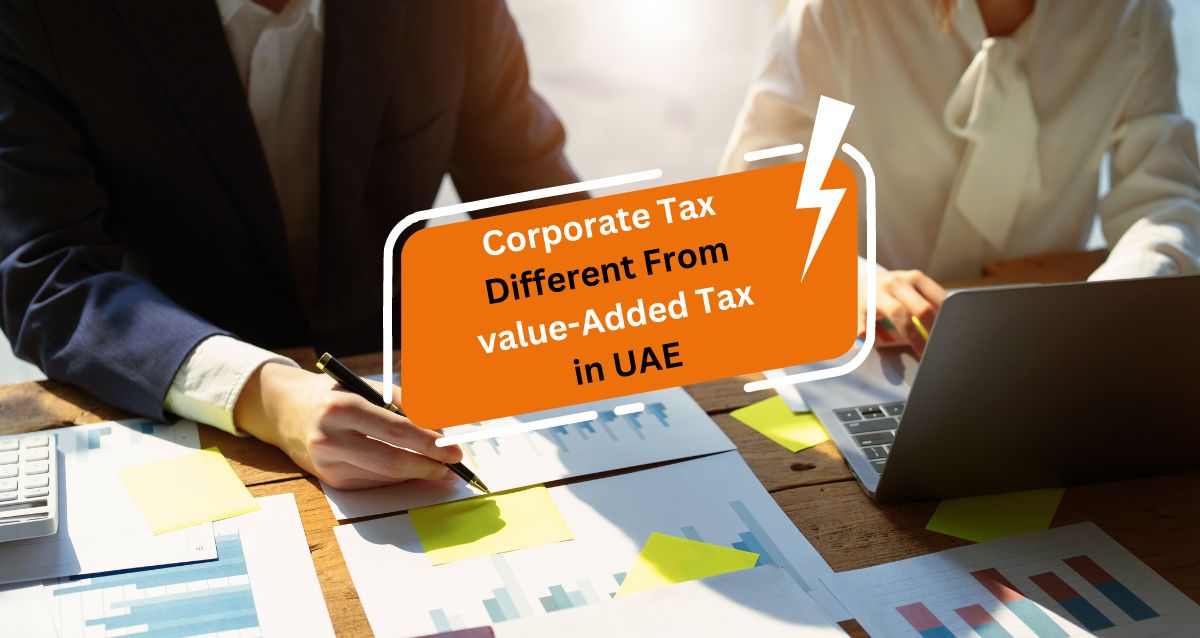Corporate Tax Different From Value-Added Tax in UAE
The United Arab Emirates (UAE) is also famous for its tax-friendly and business-friendly environment. The country is a central hub and premier location for global businesses looking to establish their operation. It has its own set of regulations and laws.
Business owners must understand the law of the land, including taxes that their company will be liable to pay while operating in the United Arab Emirates. Corporate taxes and Value-added tax are the two primary types of taxes for businesses operating in this country.
As the Value Added Tax (VAT) and corporate tax in the UAE are both crucial taxes for businesses, most businesses often get confused between corporate tax and Value Added Tax (VAT) in the UAE. Today, we will try to clear your confusion about the Corporate tax vs value-added tax in the UAE. In addition, we will provide an in-depth guide to both corporate tax and Value Added Tax in this country.

Value Added Tax (VAT)
The Value Added Tax (VAT) in the United Arab Emirates is a consumption tax applied on most products and services. Cash flow is impacted by the UAE VAT in a logistics company in Dubai because it involves collecting taxes on sales and offsetting them with taxes paid on product or service purchases.
The Value Added Tax (VAT) was introduced on 1st January 2018 in the United Arab Emirates. VAT is applicable at the rate of 5 percent in the UAE. Businesses must register themselves under the UAE Value Added Tax (VAT) if their taxable supplies and imports exceed the notified limits of AED 375,000*.
Value Added Tax (VAT) was the first general business tax to be implemented in the UAE. The tax revolutionized the entire business landscape. While pre-existing taxes on oil & gas and banks were available, these taxes did not impact the complete business community. However, the UAE VAT introduction has impacted the entire corporation landscape.
Trade in the UAE free zones does not come under the purview of Value Added Tax (VAT). Indeed, you have guessed it right! The trade within the UAE Free Zone is not subject to UAE VAT and is tax-free. At the conclusion of the period, companies registered under the UAE VAT must submit a VAT return to the Federal Tax Authority (FTA). The Value Added Tax (VAT) has provided the UAE government with an extra source of revenue to fund numerous goals that might be funded by the UAE government.
Indeed, Value Added Tax (VAT) is applied to most products and services in the United Arab Emirates. However, some goods and services are excluded from this tax, which means these products and services have been charged a VAT rate of 0 per cent. The following is the list of exempted sectors from the Value-added tax in UAE:
- Local passenger transport
- Residential property
- Supply of a few financial services
Despite the rate of Value Added Tax (VAT) in the UAE being 5 percent, tourists are eligible for a return of 85 per cent of the UAE VAT they paid on the UAE-purchased products. As customers are one who pays the Value Added Tax (VAT) in the United Arab Emirates, the UAE VAT will significantly affect them.
Corporate Tax
In the past, there was no corporate tax in the United Arab Emirates. However, the UAE government has introduced a federal tax on business profits. The Federal Tax Authority (FTA) in the UAE issued the Corporate Tax Decree Law on 9th December 2022.
The goal of the introduction of the Corporate tax in UAE is to reform the country’s economy from a fuel-based country to one with diversified revenue sources. By investing a significant amount in innovation and technology and levying the UAE corporate tax, the UAE government is moving toward this goal. The UAE government may enhance the state revenue of Dubai through the introduction of such taxes.
The UAE corporate tax is a profit-based tax applied to the net income or profit of a business. The corporate tax rate in the UAE is 9 per cent for companies with profits of more than AED 375,000*. Depending on their income, businesses in the United Arab Emirates pay corporate taxes, which do not directly impact customers. Under the new corporate tax regime, the proposed tax rates may be summarized as follows:
- A 0 per cent corporate tax rate of the United Arab Emirates (UAE) is chargeable to taxable income up to AED 3,75,000*.
- Multinational Enterprises (MNEs) falling under Pillar 2 of the BEPS 2.0 framework will be subject to OECD Base Erosion and Profit-Sharing (BEPS) rules established by the relevant authorities.
- A 9% tax rate of corporate tax in the United Arab Emirates is chargeable to taxable income above AED 3,75,000*

The UAE corporate tax’s scope includes all business and commercial activities throughout the country, except those mentioned below:
- People earning in their personal capacity, including salaries, gains from investments, and more, should not pay Corporate Tax.
- Businesses conducting in the UAE free zone
- Businesses involved in natural resource extraction will fall under the reach of emirate-based taxation norms.
Apart from these exemptions, the corporate tax has further exemptions:
- Profits gained from intra-group transactions.
- Dividends gained from foreign corporations.
- Profits made from group re-organization
Corporate tax vs value-added tax in the UAE
Here is the table for the difference between Value Added Tax (VAT) and Corporate Tax in the UAE:
| Corporate Tax | VAT |
| Corporate tax is a profit-based tax | VAT is a consumption-based tax |
| VAT is calculated by adding the value at each stage of production | Corporate tax is calculated on the profits |
| Corporate tax is applied to businesses and paid by them | VAT is borne by the clients of the goods and services they consume |
| Companies must file corporate taxes and pay them on profit |
Companies must charge VAT and remit to the FTA
|
How can Flyingcolour Tax Consultant help you?
Corporate Tax and Value Added Tax are both essential taxes for businesses operating in the UAE. Corporate tax in the UAE is a profit-based tax, whereas VAT in the UAE is a consumption-based tax. However, companies in the UAE must file and pay both taxes to the relevant authority. Flyingcolour Tax Consultant can help you to pay and file both types of taxes in this country. In addition, our experts can clear all your doubts about Corporate Tax vs value-added tax.
To learn more about How is Corporate Tax Different From Value-Added Tax in UAE?, book a free consultation with one of the Flyingcolour team advisors.
Disclaimer: The information provided in this blog is based on our understanding of current tax laws and regulations. It is intended for general informational purposes only and does not constitute professional tax advice, consultation, or representation. The author and publisher are not responsible for any errors or omissions, or for any actions taken based on the information contained in this blog.
